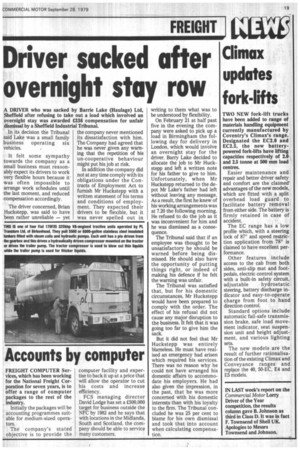Driver sacked after overnight stay row
Page 21

If you've noticed an error in this article please click here to report it so we can fix it.
A DRIVER who was sacked by Barrie Lake (Haulage) Ltd, Sheffield after refusing to take out a load which involved an overnight stay was awarded £336 compensation for unfair dismissal by a Sheffield Industrial Tribunal.
In its decision the Tribunal said Lake was a small family business operating six vehicles.
It felt some sympathy towards the company as a small business must reasonably expect its drivers to work very flexible hours because it was often impossible to arrange work schedules until the last moment, and reduced compensation accordingly.
The driver concerned, Brian Huckstepp, was said to have been rather unreliable — yet the company never mentioned its dissatisfaction with him. The Company had agreed that he was never given any warning that the repetition of his un-cooperative behaviour might put his job at risk.
In addition the company did not at any time comply with its obligations under the Contracts of Employment Act to furnish Mr Huckstepp with a written statement of his terms and conditions of employment. They expected their drivers to be flexible, but it was never spelled out in writing to them what was to be understood by flexibility.
On February 21 at half past five in the evening the company were asked to pick up a load in Birmingham the following day for delivery in London, which would involve an overnight stay for the driver. Barry Lake decided to allocate the job to Mr Huckstepp and left a written note for his father to give to him. Unfortunately, when Mr Huckstepp returned to the depot Mr Lake's father had left without leaving any message. As a result, the first he knew of his working arrangements was at 7.20 the following morning. He refused to do the job as it was inconvenient for him and he was dismissed as a consequence.
The Tribunal said that if an employee was thought to be unsatisfactory he should be warned before being dismissed. He should also have the opportunity of putting things right, or indeed of making his defence if he felt the warning was unfair.
The Tribunal was satisfied that, but for his domestic circumstances, Mr Huckstepp would have been prepared to comply with the order. The effect of his refusal did not cause any major disruption to the business. It felt that it was going too far to give him the sack.
But it did not feel that Mr Huckstepp was entirely blameless. He must have realised an emergency had arisen which required his services. There was no reason why he could not have arranged his domestic affairs to accommodate his employers. He had also given the impression, in the past, that he was more concerned with his domestic interests than with his loyalty to the firm. The Tribunal concluded he was 25 per cent to blame for his own dismissal and took that into account when calculating compensation.




























































































































































